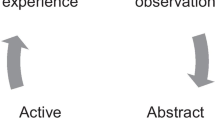Abstract
Andragogy – the study of adult education – has been endorsed by many medical educators throughout North America. There remains, however, considerable controversy as to the validity and utility of adult education principles as espoused by the field's founder, Malcolm Knowles. Whatever the utility of andragogic doctrine in general education settings, there is reason to doubt its wholesale applicability to the training of medical professionals. Malcolm Knowles' last tenet of andragogy holds that adult learners are more motivated by internal than by external factors. The validity of this hypothesis in medical education is examined, and it is demonstrated that medical students' internal and external motivation are context-dependent, not easily distinguishable, and interrelate with one another in complex ways. Furthermore, the psychological motivation for medical student learning is determined by a variety of factors that range from internal to external, unconscious to conscious, and individual to societal. The andragogic hypothesis of increased internal motivation to learn on the part of adults in general, and medical trainees in particular, is rejected as simplistic, misleading, and counter productive to developing a greater understanding of the forces that drive medical students to learn.
Similar content being viewed by others
References
American Psychiatric Association & American Psychiatric Association. Joint Commission on Public Affairs (1984). The American Psychiatric Association's Psychiatric glossary. Washington, D.C.: American Psychiatric Press.
Campbell, R.J. (1989). Psychiatric Dictionary (6th ed.). New York: Oxford University Press.
Davenport, J. & Davenport, J.A. (1985). A chronology and analysis of the andragogy debate. Adult Education Quarterly 35: 152–159.
Fowell, S. & Bligh, J. (2001). Assessment of undergraduate medical education in the UK: time to ditch motherhood and apple pie. Medical Education 35: 1006–1007.
Gabbard, G.O. & Menninger, R.W. (1988). The psychology of the physician. In G.O. Gabbard & R.W. Menninger (eds.), Medical Marriages (pp. 23–38). Washington, DC: American Psychiatric Press.
Knowles, M.S., Holton, E. & Swanson, R.A. (1998). The Adult Learner: The Definitive Classic in Adult Education and Human Resource Development (5th ed.). Houston, Tex.: Gulf Pub. Co.
Mavis, B.E., Cole, B.L. & Hoppe, R.B. (2001). A survey of student assessment in US medical schools: the balance of breadth versus fidelity. Teaching and Learning in Medicine 13: 74–79.
Merriam, S.B. & Caffarella, R.S. (1999). Learning in Adulthood: A Comprehensive Guide (2nd ed.). San Francisco: Jossey-Bass Publishers.
Norman, G.O. (1999). The adult learner: a mythical species. Academic Medicine 74: 886–889.
Vaillant, G.E., Sobowale, N.C. & McArthur, C. (1972). Some psychologic vulnerabilities of physicians. New England Journal of Medicine 287: 372–375.
Author information
Authors and Affiliations
Rights and permissions
About this article
Cite this article
Misch, D.A. Andragogy and Medical Education: Are Medical Students Internally Motivated to Learn?. Adv Health Sci Educ Theory Pract 7, 153–160 (2002). https://doi.org/10.1023/A:1015790318032
Issue Date:
DOI: https://doi.org/10.1023/A:1015790318032




